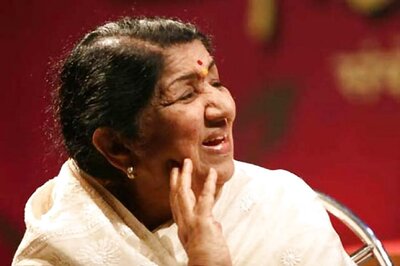
views
Time was when woman-centric cinema was common in Tamil Nadu, and legendary directors created classics in this genre. I can never forget K Balachander's Aval Oru Thodarkathai – where Sujatha portrays the angst and agony of a woman who has to sacrifice marriage, because she has to take care of a large family, her father having renounced the world and her brother being a perennial drunk. This was one of the many films of Balachander where women held centre-stage.
Director Bhagyaraj was as powerful as Balachander. Bhagyaraj's Antha 7 Naatkal (later made in Hindi as Woh Saat Din) also had a woman who pines for her lover, but decides in the end to remain married to a widower, because she grows fond of his child and ageing mother.
And Balu Mahendra's Moondram Pirai had Sridevi as a woman who loses her memory, and the actress stole the show from one as brilliant as Kamal Haasan.
But somewhere in the years that followed the active careers of Balachander. Bhagyaraj and Balu Mahendra, Tamil movies veered off this course, and rolled into the arms of men like Rajinikanth and Haasan and Vijay and Surya and so on – actors who gave little space or scope for actresses. Take, for instance, any Rajinikanth film, and women there are reduced to being beautifully painted dolls. Ditto, Vijay's latest Mersal, and so many of Haasan's works.
So, I was impressed to see Nayanthara as a no-nonsense District Collector in the just-opened Gopi Nainar's Aramm. The movie is all about her, and Aramm deals with a huge present-day problem, that of deep, unused borewells, which are bone-dry and left uncovered by callous contractors. The openings of these wells are at ground level, and that is what makes them so dangerous.
One fine morning, Nayanthara's Madhivadhini (an IAS officer) gets a phone call about a four-year-old village girl, Dhansika, having fallen into such a pit, about 90 feet deep. The officer rushes to the spot to be confronted by what looks like insurmountable problems: a broken-down fire engine blocking the only narrow road to the village, hysterical parents of the girl, angry villagers baying for the blood of the guilty, ruthless politicians and an insensitive media.
We have seen such journalists before. Remember the way some photographers behaved in the Paris underpass when Princess Diana was dying after a car crash. In Aramm too, we see several television crews shooting a volley of questions -- distracting and wearing out the patience of Madhivadhini and the others, desperately trying to rescue the girl with a volley of questions.
What is most remarkable about Aramm is its ability to stay on track for those 10 or 12 hours when Dhansika lay trapped in the dark well – although I did at times feel the background score a little too disturbing. No costume change for Nayanthara, who was seen throughout the film (except for brief periods when she is answering to a chargesheet in a Chennai office) in the same sari. Subtle and subdued, she goes about taking one risky decision after another (in the end, Dhansika's brother is lowered into the well to get her out) most stoically, and I am sure the actress has certainly carved a fine niche for herself with this movie. Indeed a performance that she will be remembered for a while.
And, who knows, Aramm may be just about the beginning of a series of Tamil films that will transform heroines into heroes. In short, Nayanthara has been given a chance to step into a man's shoes, and she has done this with style and substance.
There is also a sense of controlled helming, and Nainar appears to have avoided the pitfalls of exaggerations often seen in Tamil pictures, although I did feel something lacking in those scenes which show us crowd going berserk. But some lovely shots by cinematographer Om Prakash are something to take home. I was particularly fascinated by the scene where we see the reflection of men and women walking along a water body.
What is equally important, Aramm focuses on the perils of leaving deep borewells open, a sure invitation for the death of kids. In recent years, there have been dozens of such cases in rural India. Sometimes, children have been lucky. Sometimes, they have died.
Believe it or not, on Deepavali night, a friend's nine-year-old son fell into a borewell in Chennai that had water and had been carelessly left open. The stars must have favoured him that day, for he held on to the edge of the well and extricated himself!
Well, then, Aramm is a must watch for all those – especially in villages – who care for human life, and who could perhaps help herald a new chapter in Tamil cinema.
Watch the trailer here:
(Gautaman Bhaskaran is an author, commentator and movie critic)




















Comments
0 comment